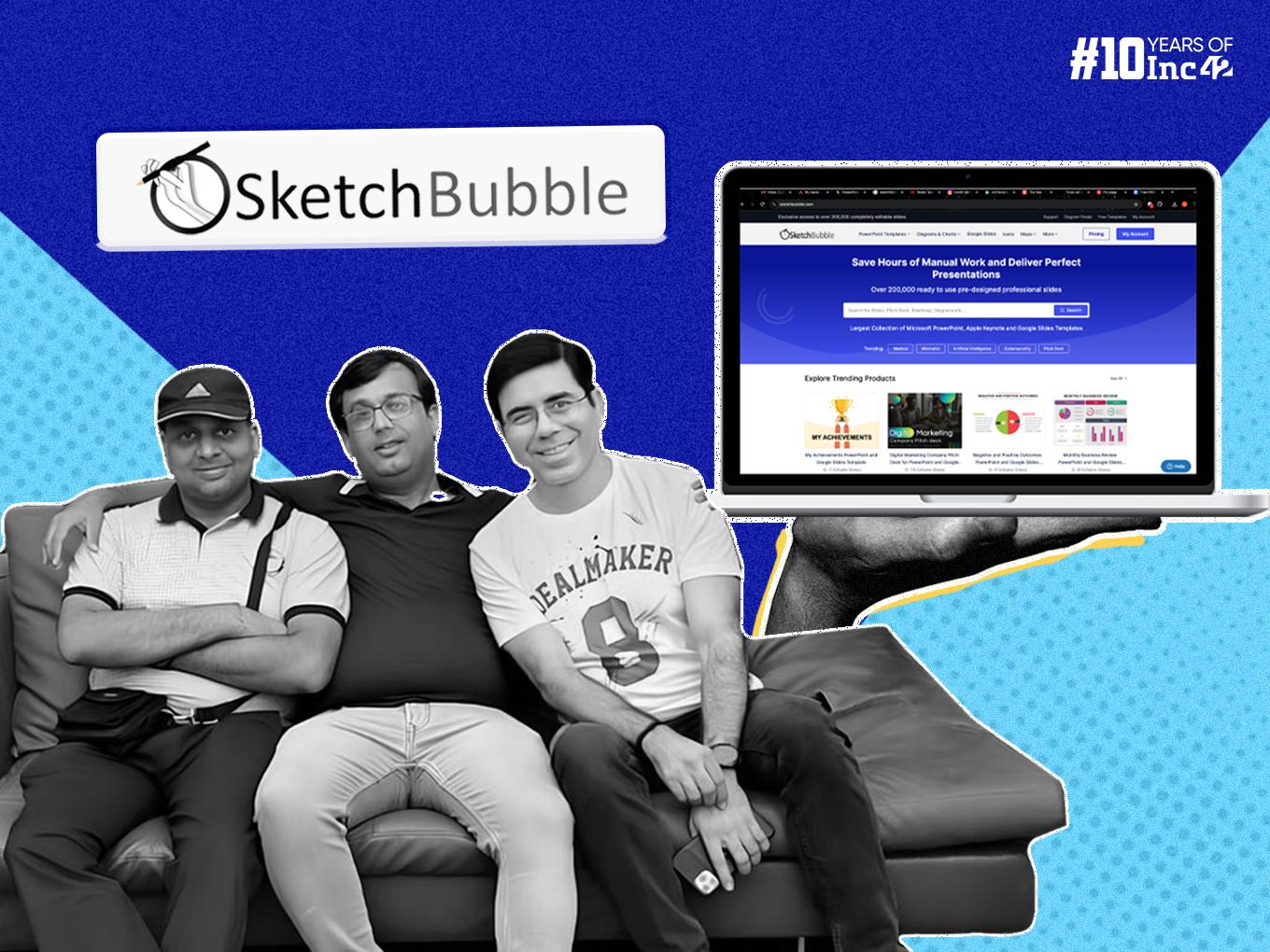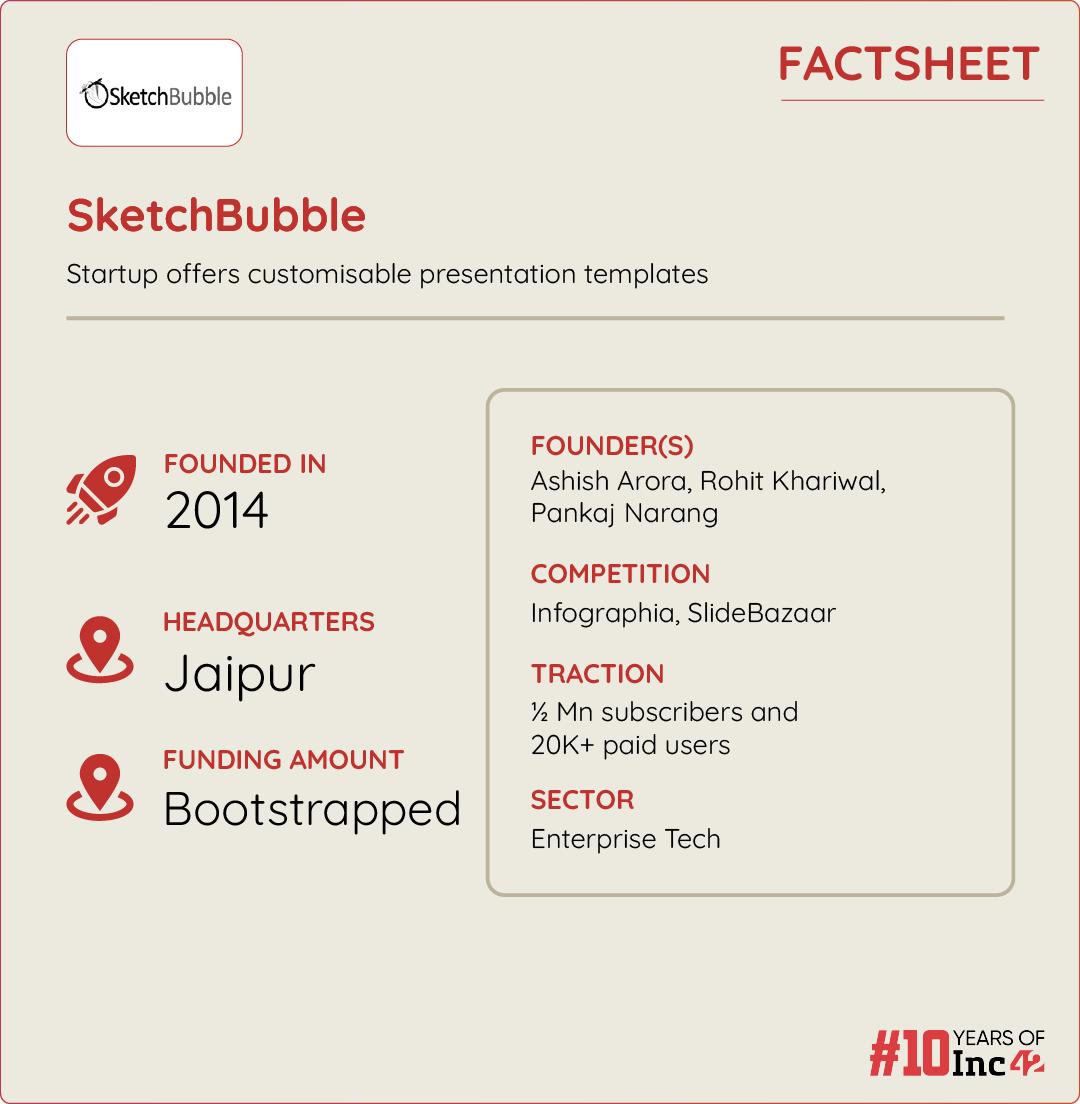In The Age Of AI, Can SketchBubble Redefine The Art Of Presentations?

In a post-Covid world, digital transformation drives business innovation, and effective communication positively influences stakeholders and customers. However, presenting the organisational vision and values, data and strategies to one’s audience is changing fast in this era of Zoom, Pitch and Slack, where communication is instant, free-flowing and collaborative. Despite their global reach and early-mover advantages, legacy presentation tools like Microsoft PowerPoint, Google Slides or Apple Keynote could lose their sheen to this new breed of technology tools.
But the ubiquitous slides, hitherto part and parcel of all corporate presentations worldwide, may not disappear just yet, given the presence of a presentation design startup called SketchBubble. For a decade now, its founders Ashish Arora, Rohit Khariwal and Pankaj Narang have blended design expertise with creative flair and technology trends to develop a stunning range of templates compatible with all major platforms (Google, Apple and MS) to help individuals and businesses create outstanding presentations.
The startup currently provides 2 Lakh+ customisable slides (subscription-based offerings) and 1K+ free templates, as well as diagrams/charts, maps, icons and other design elements, which are copyright-free. The templates cover a wide range of trending domains such as pitch decks, technology, business & finance, projects & industries, elearning, healthcare and organisational excellence and feature static and animated visuals.
However, the founders would not term their offerings as mere visual resources.
“A good presentation goes way beyond immersive visuals. It is a perfect blend of narrative building, data incorporation and communication tech that can convince and captivate your audience. We offer unlimited presentation modules with compelling visuals and layouts and ensure that our designs effectively support our clients’ business plans, saving their time and resources,” they pointed out.
Now that GenAI (generative AI) and ChatGPT iterations are widely available for creative work, SketchBubble aims to deliver presentation designs that surpass AI production. “Our goal is to offer designs that stay ahead of AI presentations consistently. It is the only way to survive as a template provider in the future. We believe that the human touch will always be required to maintain creativity and uniqueness,” said Arora.
SketchBubble has nearly half a million subscribers, including 20K+ paid users. It caters to big corporate houses such as Adobe, IBM, HP, Toyota, Mercedes-Benz, Volvo and Vodafone and claims a 50% YoY revenue growth since 2020.

How SketchBubble Entered Presentation Space, Coped With Design Challenges
Arora, Khariwal and Narang graduated from Malaviya National Institute of Technology (MNIT) in Jaipur and set up a software startup called InfoShore in 2008. Two years later, when they were developing a mobile tracker and required funding, they had to hire a freelancer to design a pitch deck.
“The work was impressive, but the charges were steep,” recalled Arora. “We also noticed the time and effort people invested in mastering design tools like PowerPoint to create decent presentations.” The other option was to engage designers as the trio did, but explaining one’s vision to third-party service providers was difficult at times, and outcomes were not satisfactory.
Aware of the fact that rolling out effective designs requires a well-rounded offering that is neat, feature-rich, and easy to use, the trio launched SketchBubble in 2014, an online platform that simplifies presentation-making with ready-made templates.
Its business model is simple enough. Individuals can use free templates or subscribe to a monthly ($49), quarterly ($99) or annual ($199) plan. One can have varying levels of access to an extensive template library based on the subscription. However, enterprises can only opt for a yearly plan.
All this may sound like a mission accomplished, but the challenges had just started.
Lack of skilled designers: In its early days, SketchBubble found it difficult to source skilled designers in Jaipur who could create professional-grade presentation templates. The founders recruited fresh talent and trained them in-house to bridge this gap.
GenAI poses a mounting challenge: In the past couple of years, GenAI applications have transformed the design space, ushering in a new scope for creativity. Powered by the latest technology, designers today can generate images based on text briefs, automate tasks and speed up delivery without charging a fortune. In fact, according to an Adobe survey last year, 71% of creative pros said they would use GenAI tools for professional work.
“The rise of AI-based tools has undoubtedly become a challenge for us. But after testing several AI-powered presentation-makers, we have found that they still lack the creativity of human designers. Even the best AI-generated slides require significant human intervention, adding time and effort to the process. We are working hard to innovate and enhance our presentation templates to stay ahead of AI,” said Arora.
Limited budget for marketing: SketchBubble’s target audience spans a diverse group, ranging from startup founders, HR executives and online educators to project managers and motivational speakers.
“Our slides help them convey messages with clarity and visual appeal. Public speakers and motivational leaders rely on our templates for impactful conferences and webinar presentations, while online educators use these to craft engaging elearning courses,” detailed Arora.
The only glitch: The bootstrapped startup could only spend a limited amount on marketing.
To broaden its reach and stay up to date with current trends, the founders have adopted search engine optimisation (SEO) as a core strategy. The SketchBubble team tracks high-demand search topics and promptly develops new templates if these are missing from its existing database. It also monitors competition, follows design influencers and offers free templates for bringing in new users.
“We create the slides in Microsoft PowerPoint and make them compatible with Google Slides and Apple Keynote. Templates for Excel and Google Sheets will be available in the coming months,” said Arora.
The startup will also expand its marketing budget in 2025 to capture a bigger market share.
SketchBubble Wants To Beat GenAI, But Will It Succeed?
Globally, the presentation software market is projected to reach a little over $16K Mn by 2031 from $6.7K Mn in 2024, at a CAGR of 13.5%. Although India’s numbers are not readily available, the Asia-Pacific region is emerging as the fastest-growing market, given the rising number of enterprises and increasing digitalisation across industries and business verticals. Will that be a double-whammy for SketchBubble and its ilk, keen to integrate human creativity in a tech-driven landscape now increasingly dominated by GenAI?
GenAI has undoubtedly made great strides in automating creative tasks like design and content creation. According to HubSpot, 55% of the web designers surveyed said their companies or key ‘freelance’ clients encourage using GenAI tools due to better idea generation and cost and time advantage. In contrast, 16% said their service users discouraged such design tools.
Although GenAI has disrupted creative work, efficiently organising information from massive datasets, incorporating user feedback and producing visually appealing presentations in no time, it is still difficult for machines to monopolise creativity. Arora says three critical elements – the power of weaving a great narrative, the art of creating emotional resonance and the skill to improvise in real time – are essential for successfully connecting with the audience. Done right, that is the ultimate goal of the presentation industry, and missing the human link may not serve its purpose.
Many experts suggest that GenAI will work as a valuable brainstorming and execution tool, carrying out superior human creativity and commands. Ultimately, success will be in striking the right balance between humans and technology. Otherwise, a major chunk of India’s $3.9 Bn creator economy (globally, $528.4 Bn by 2030) may suddenly crumble, leaving people grappling with a machine-manipulated makeover mania where design may fail to achieve the desired impact.
The post In The Age Of AI, Can SketchBubble Redefine The Art Of Presentations? appeared first on Inc42 Media.
No comments